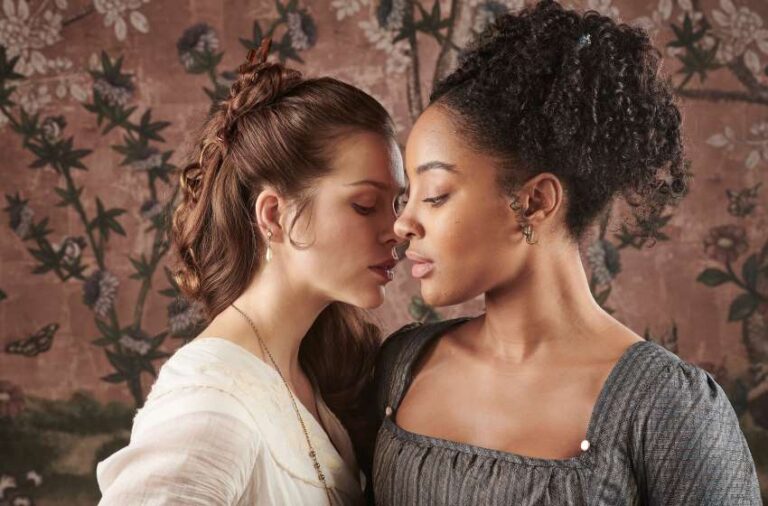JAMAICAN-BORN, CAYMANIAN-BRITISH novelist and former lawyer Sara Collins says when she was offered the chance to adapt her novel, The Confessions of Frannie Langton, for television, she knew “straightaway” that she didn’t want to write “yet another period drama where the only thing that happens to the black characters is slavery”.
Starring Karla-Simone Spence in the title role, The Confessions of Frannie Langton, set against the opulence of Georgian London, narrates Frannie’s journey from a Jamaican plantation to the grand Mayfair mansion of celebrated scientist George Benham and his wife, Madame Marguerite Benham.
Frannie falls hopelessly in love with Marguerite after being brought to London and sent into service in her husband’s household. United in their longing to escape society’s limiting expectations, they slip into an intense emotional and sexual entanglement with each other.
Speaking on presenting the unusual narrative, Collins said: “My life-long irritation with the depiction of black characters in historical fiction as nothing but victims of that institution was the reason I’d written the novel in the first place.”
She added: “But I also wanted to avoid the sort of colour blind fantasy about interracial romance that seems to be in vogue nowadays – deliciously anachronistic, but occasionally guilty of indulging the audience’s self-serving reasons for pretending slavery never happened at all.
“Instead, I wanted to dramatise a passionate love affair between a black woman and her white mistress in Regency London.

“We’ve been led to assume this kind of thing would never have happened, which is precisely why it’s the story I wanted to tell.”
On what attracted her to The Confessions of Frannie Langton, Spence enthused: “It’s an incredible story.
“I was really intrigued by Frannie’s journey. She’s an incredibly witty, resilient woman. As soon as I read the scripts I was like, ‘I have to play her.’ I really wanted this role.”
Describing the journey, Spence added: “It’s a period drama, set in the 1800s. It’s Frannie’s story and she wants the world to know what she went through from her own account.
“When Frannie arrives in England from Jamaica with John Langton, she is technically a free woman.
“She could run into this new world, but where would she go? Frannie is a survivor. She has made difficult decisions in order to survive.
“So in that moment she chooses to stick with the devil she knows. A choice that has led her to where we find her at the beginning of the show.”
She added: “In the show people assume many things about Frannie and the life that she has led, including that she can’t read or write. But she has a great love of reading and for books. She can be the most intelligent person in the room but can’t always show it.
“They assume that Frannie would be subservient, having been a former slave. She is not. Only when it suits her to be.
“They assume that her connection to Madame is an obsession that carries ulterior motives, but this is simply not the case. Frannie is young and hasn’t really experienced love before.
“She did eventually know who her mother was, but she never had that maternal bond. Frannie never felt that she was nurtured and looked after.
“So when she discovers Madame (Sophie Cookson), it is such a breath of fresh air for her. She has never had a romantic connection with anyone. When she first meets Madame she feels this magnetic attraction, that she doesn’t quite understand.
“Initially, Frannie is very impressed with Madame’s literary taste. Madame is very forward in her thinking and voices her thoughts, just as Frannie does and Frannie admires that.
“But in 1820s England, love between two women is a forbidden love. Society does not approve, but Frannie doesn’t care. She has always lived her life having to conform and being a certain way. Now she doesn’t want to hide anymore.”
Delving into the complexity of Frannie, Collins said it was important to ‘convey her passion as an act of defiance against impossible odds’.

“Sadly, depicting a black woman (in any era, but even more so in a period piece) who is driven by an unbridled desire for all the things the world says she isn’t supposed to have — sex, love, an education, control of her body and her choices — might still be viewed by some as subversive.
“But every time I faced the blinking cursor of the draft screenplay, and the challenges that came with getting the series made, I reminded myself that it was a rare opportunity to embody the sensuality and psychological complexity that characters like Frannie have for too long been denied.”
Full of praise, Collins said Spence’s performance was ‘full of tenderness and intelligence, vulnerability and rage’.
Spence admitted landing the role was a big deal.
She enthused: “I poured everything into my final round of auditions. When my agent called to say they were offering me the role, I screamed and had to mute myself because I just went crazy.
“I was really happy. I had waited for this moment for a really long time and it was worth the wait.”
The Confessions of Frannie Langton premiered on new, free streaming service, ITVX


Comments Form